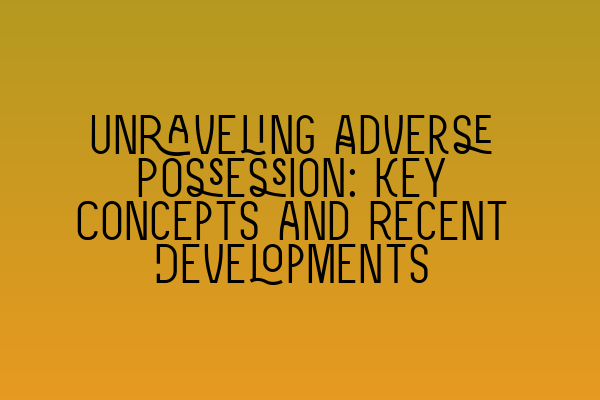Unraveling Adverse Possession: Key Concepts and Recent Developments
In the world of property law and land law, there is one concept that has intrigued legal minds for centuries – adverse possession. Adverse possession refers to the legal principle by which a person can become the legal owner of a piece of property simply by occupying and using it for a certain period of time, usually ranging from 10 to 20 years. This legal doctrine is rooted in the belief that it is unjust to allow a landowner to neglect their property indefinitely while denying others the opportunity to make productive use of it.
Understanding the key concepts behind adverse possession is essential for both property owners and those seeking to claim ownership of land through this mechanism. In this blog post, we will delve into the intricacies of adverse possession, discussing its legal foundation and recent developments in this area.
Legal Foundation of Adverse Possession
Adverse possession is a complex legal concept with its foundation in the common law system. The doctrine of adverse possession allows a person to acquire ownership of land by treating it as their own openly, notoriously, and exclusively for a continuous period of time. The occupation must be adverse to the rights of the true owner, meaning that the possessor does not have the owner’s permission to occupy the land.
To successfully claim adverse possession, certain key requirements must be met. These typically include:
1. Actual Possession: The claimant must physically occupy the land and use it as if they were the rightful owner. Mere presence or occasional use may not be sufficient.
2. Open and Notorious: The occupation must be visible and obvious to the true owner. It should not be hidden or secretive.
3. Exclusive Possession: The claimant must have exclusive control over the land, excluding others, including the true owner.
4. Continuous Possession: The occupation must be continuous for the required period of time, which varies depending on the jurisdiction.
5. Hostile Possession: The occupation must be adverse to the rights of the true owner. This means that the claimant must not have the owner’s permission to occupy the land.
Recent Developments in Adverse Possession
Over the years, courts and legislatures have made efforts to strike a balance between protecting the interests of property owners and recognizing the rights of adverse possessors. Recent developments in adverse possession laws reflect this ongoing balancing act.
One notable development is the tightening of the requirements for adverse possession claims. Courts now scrutinize the elements of adverse possession more closely, emphasizing strict compliance. Any lapses in meeting the necessary conditions can result in a claim being dismissed.
Additionally, some jurisdictions have enacted legislation to limit the circumstances in which adverse possession can be claimed. For instance, certain states now require adverse possessors to pay property taxes on the occupied land during the statutory period, thereby adding a financial burden as a prerequisite for acquiring ownership.
The Role of SQE Property Law & Land Law Solicitors
Given the intricacies and challenges associated with adverse possession claims, it is crucial to seek professional legal advice from qualified solicitors specializing in property law and land law. At SQE Property Law & Land Law, our team of expert solicitors understands the nuances of adverse possession and can guide you through the complex process.
We offer a range of services to assist property owners in protecting their rights and adverse possessors in making their claims. Our solicitors can provide comprehensive advice on adverse possession-related matters, including assessing the merits of your claim, ensuring compliance with legal requirements, and representing you in court if necessary.
Conclusion
Adverse possession is a fascinating legal concept that has significant implications for property owners and adverse possessors alike. Understanding its key concepts and recent developments is essential for anyone involved in property disputes or seeking to claim ownership through adverse possession.
If you require assistance with adverse possession, don’t hesitate to reach out to SQE Property Law & Land Law solicitors. Our team of dedicated professionals is well-equipped to handle the complexities of adverse possession cases and offer expert advice tailored to your specific situation. Contact us today for a consultation and let us help you navigate the intricate world of property law.
Related Articles:
– SQE 1 Practice Exam Questions
– SQE 1 Practice Mocks FLK1 FLK2
– SQE 2 Preparation Courses
– SQE 1 Preparation Courses
– SRA SQE Exam Dates
